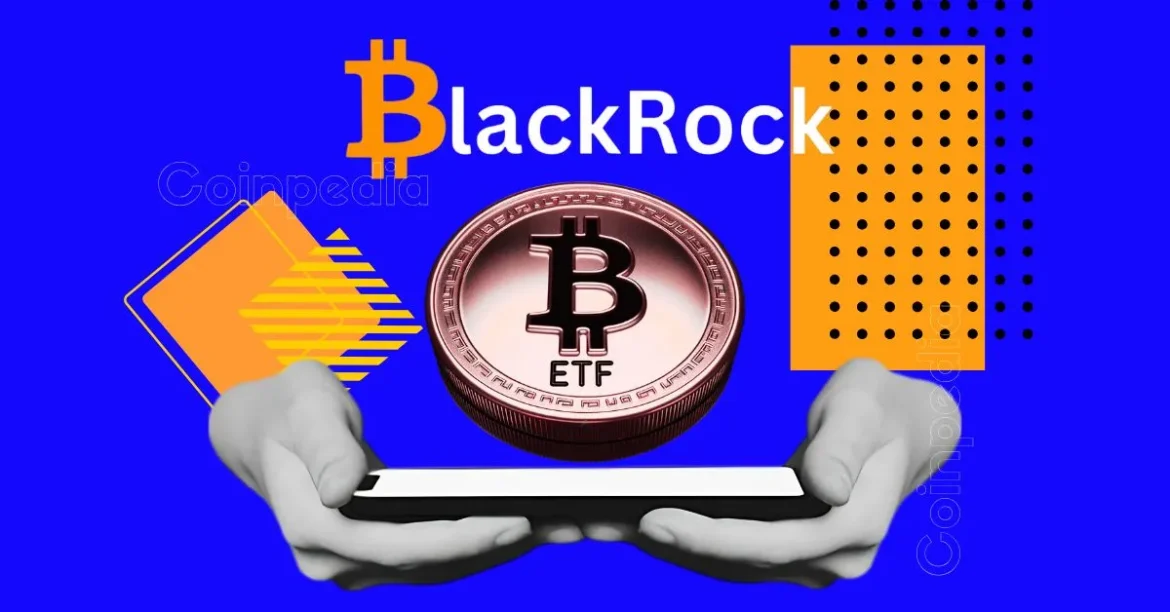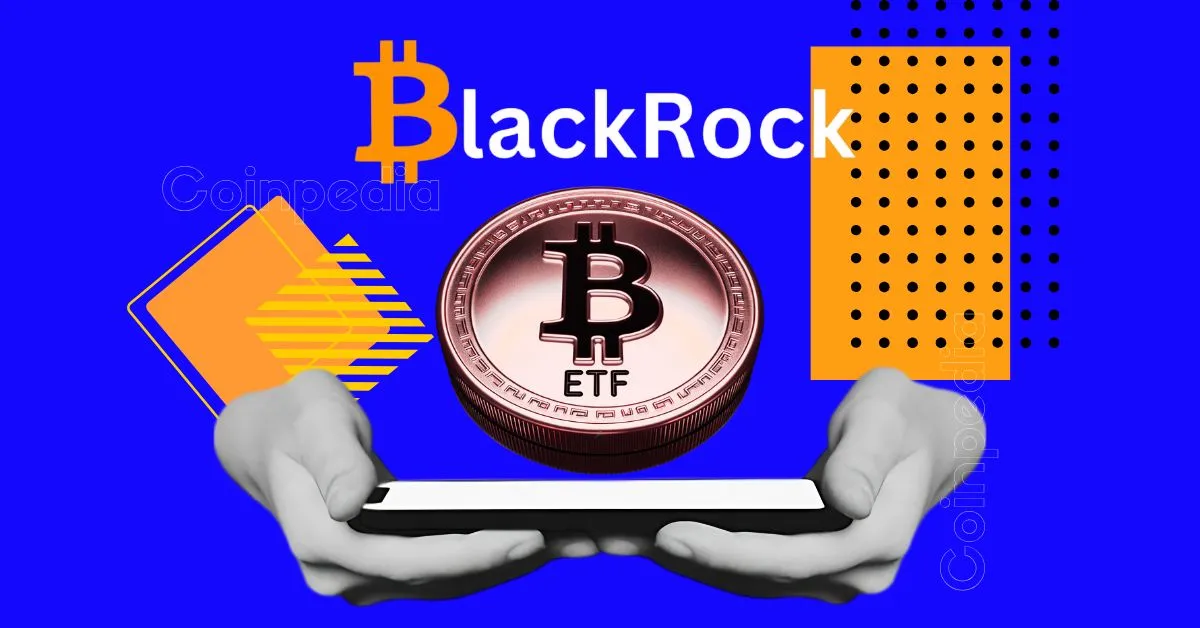BlackRock’s iShares Bitcoin Trust (IBIT) has emerged as a titan in the cryptocurrency investment landscape, amassing over 700,000 Bitcoin in a remarkably short period. This milestone is not merely a numerical achievement but a testament to the evolving perception of Bitcoin among institutional investors. The rapid ascent of IBIT underscores a fundamental shift in how traditional finance engages with digital assets, marking a pivotal moment in the history of both Bitcoin and the broader financial industry.
The Lightning-Fast Rise of IBIT
Launched in January 2024, IBIT’s trajectory has been nothing short of extraordinary. Within just 18 months, it has accumulated over $75 billion in assets under management (AUM), a feat that has made it one of BlackRock’s most successful ETF launches to date. This rapid growth is unprecedented, even when compared to established ETFs, and highlights the pent-up demand for Bitcoin exposure among institutional investors who were previously hesitant to enter the crypto market directly.
Several factors have contributed to IBIT’s meteoric rise. Firstly, BlackRock’s reputation as the world’s largest asset manager lends unparalleled credibility and trust to the Bitcoin ETF space. The firm’s track record in risk management and regulatory compliance provides investors with a sense of security, making IBIT an attractive option for those seeking exposure to Bitcoin without the complexities of direct ownership. Secondly, the ease of access offered by ETFs is a significant draw. These investment vehicles provide a familiar and regulated means of accessing Bitcoin, which is particularly appealing to institutional investors with internal mandates or compliance requirements that may prevent them from holding Bitcoin directly.
The approval of spot Bitcoin ETFs by the U.S. Securities and Exchange Commission (SEC) in early 2024 marked a turning point in the perception of Bitcoin as a legitimate asset class. This regulatory green light has paved the way for increased institutional adoption, further fueling IBIT’s growth. The combination of BlackRock’s reputation, the convenience of ETFs, and the growing acceptance of Bitcoin as a mainstream asset has positioned IBIT as a dominant force in the market.
Dominating the US Spot Bitcoin ETF Landscape
IBIT’s holdings of over 700,000 Bitcoin represent a substantial portion of the total Bitcoin held across all US spot Bitcoin ETFs. In fact, IBIT alone accounts for approximately 55% of the total BTC held by these ETFs, solidifying its position as the dominant player in the market. This dominance gives BlackRock significant influence over the Bitcoin market and further reinforces the legitimacy of Bitcoin as an investment asset.
The accumulation of such a large Bitcoin position has implications for the overall supply dynamics of Bitcoin. With IBIT consistently absorbing a significant portion of the newly mined Bitcoin, it puts upward pressure on the price and reduces the available supply for other market participants. This dynamic could further accelerate Bitcoin’s price appreciation in the long run. As institutional demand continues to grow, the competition for Bitcoin supply is likely to intensify, potentially leading to sustained upward pressure on prices.
Moreover, IBIT’s dominance in the Bitcoin ETF market underscores the growing institutional acceptance of Bitcoin. The fact that the world’s largest asset manager is actively accumulating Bitcoin validates the asset class and provides reassurance to investors. This can lead to increased confidence and a greater willingness to hold Bitcoin for the long term, further solidifying its position in the financial landscape.
More Than Just Bitcoin: IBIT’s Revenue Generation
Beyond its impressive AUM and Bitcoin holdings, IBIT is also becoming a significant revenue driver for BlackRock. Its higher fee structure, compared to BlackRock’s flagship S&P 500 fund (IVV), allows it to generate substantial revenue despite not having as much in assets under management. This demonstrates the profitability of Bitcoin ETFs and highlights the growing demand for these products among investors.
IBIT’s revenue generation is a testament to the power of innovation in the financial industry. By creating a product that caters to the specific needs and preferences of institutional investors, BlackRock has unlocked a new revenue stream and solidified its position as a leader in the ETF market. The success of IBIT also highlights the potential for other asset managers to follow suit, further expanding the Bitcoin ETF landscape and increasing competition in the space.
The profitability of IBIT is not only beneficial for BlackRock but also for the broader Bitcoin ecosystem. As more institutional investors allocate capital to Bitcoin through ETFs, the demand for Bitcoin is likely to increase, further driving up its price. This can create a virtuous cycle, where rising prices attract even more investors, further fueling the rally. The revenue generated by IBIT also provides BlackRock with the resources to continue innovating and expanding its offerings in the cryptocurrency space, potentially leading to the development of new products and services that cater to the evolving needs of investors.
Larry Fink’s Transformation: From Skeptic to Believer
One of the most intriguing aspects of BlackRock’s embrace of Bitcoin is the transformation of its CEO, Larry Fink. Initially cautious about Bitcoin, Fink has become increasingly optimistic about its potential. This shift in attitude reflects the growing acceptance of Bitcoin within the traditional financial establishment.
Fink’s newfound enthusiasm for Bitcoin is not merely a PR stunt. It is based on a deep understanding of the underlying technology and the growing demand for Bitcoin among BlackRock’s clients. His public support for Bitcoin has further legitimized the asset class and encouraged other institutional investors to explore the space. Fink’s transformation from skeptic to believer is a powerful indicator of the changing tides in the financial world, where traditional institutions are increasingly recognizing the value and potential of digital assets.
The shift in Fink’s perspective also highlights the evolving role of Bitcoin in the global economy. As more institutions and individuals recognize Bitcoin’s potential as a store of value and a hedge against inflation, its acceptance as a legitimate asset class is likely to continue growing. This, in turn, can lead to increased adoption and integration of Bitcoin into the broader financial system, further solidifying its position as a mainstream investment asset.
The Impact on Bitcoin’s Price and Market Dynamics
IBIT’s massive Bitcoin holdings have a profound impact on the price and market dynamics of Bitcoin. As IBIT continues to accumulate Bitcoin, it reduces the available supply on exchanges, creating scarcity and driving up the price. This dynamic is further amplified by the increasing institutional demand for Bitcoin, which is consistently outpacing miner supply.
The long-term implications of IBIT’s dominance in the Bitcoin ETF market are significant. As more institutional investors allocate capital to Bitcoin through IBIT and other ETFs, the price of Bitcoin is likely to continue to rise. This could lead to a virtuous cycle, where rising prices attract even more investors, further fueling the rally. The reduced supply of Bitcoin on exchanges can also lead to increased volatility, as the market adjusts to the changing dynamics of supply and demand.
The impact of IBIT on Bitcoin’s price and market dynamics is not limited to the short term. As institutional adoption continues to grow, the demand for Bitcoin is likely to increase, further driving up its price. This can lead to a sustained bull market, where Bitcoin’s price continues to appreciate over the long term. The reduced supply of Bitcoin on exchanges can also lead to increased competition among investors, further driving up prices and creating a more dynamic and active market.
Beyond the Numbers: The Psychological Impact
IBIT’s success also has a significant psychological impact on the Bitcoin market. The fact that the world’s largest asset manager is actively accumulating Bitcoin validates the asset class and provides reassurance to investors. This can lead to increased confidence and a greater willingness to hold Bitcoin for the long term.
The psychological impact of IBIT’s success is particularly important in the volatile world of cryptocurrency. By providing a sense of stability and legitimacy, IBIT can help to reduce fear and uncertainty, making Bitcoin a more attractive investment for a wider range of investors. The validation of Bitcoin by a major financial institution like BlackRock can also help to dispel some of the skepticism and misconceptions that have historically surrounded the asset class, further increasing its acceptance and adoption.
The psychological impact of IBIT’s success is not limited to institutional investors. Retail investors, who have long been at the forefront of the Bitcoin movement, can also benefit from the increased legitimacy and stability that IBIT brings to the market. As more institutions and individuals recognize the value and potential of Bitcoin, its acceptance as a legitimate asset class is likely to continue growing, further solidifying its position in the financial landscape.
A Glimpse into the Future of Finance
BlackRock’s IBIT is more than just a Bitcoin ETF; it is a symbol of the evolving relationship between traditional finance and the world of cryptocurrency. Its rapid growth and dominance in the market demonstrate the increasing institutional acceptance of Bitcoin as a legitimate asset class. As IBIT continues to accumulate Bitcoin and attract new investors, it will play a key role in shaping the future of finance.
The success of IBIT highlights the potential for other asset managers to follow suit, further expanding the Bitcoin ETF landscape and increasing competition in the space. This can lead to the development of new products and services that cater to the evolving needs of investors, further integrating Bitcoin into the broader financial system. The growing acceptance of Bitcoin as a legitimate asset class can also lead to increased adoption and integration of cryptocurrency technologies into the financial infrastructure, further revolutionizing the way we think about money and investments.
The Road Ahead: Challenges and Opportunities
While IBIT’s success is undeniable, it also faces certain challenges and opportunities moving forward. As the Bitcoin ETF market matures, competition is likely to intensify. Other asset managers will undoubtedly launch their own Bitcoin ETFs, potentially eroding IBIT’s market share. This competition can lead to innovation and the development of new products and services that cater to the evolving needs of investors, further expanding the Bitcoin ETF landscape.
Regulatory uncertainty remains a significant challenge for the Bitcoin ETF market. The regulatory landscape for cryptocurrency is still evolving, and new regulations could impact the operation and attractiveness of Bitcoin ETFs. As governments and regulatory bodies around the world continue to grapple with the implications of cryptocurrency, the regulatory environment is likely to remain fluid and uncertain. This can create challenges for Bitcoin ETFs, as they navigate the complex and evolving regulatory landscape.
Bitcoin’s volatility is another challenge that IBIT must contend with. Bitcoin is known for its price volatility, and sharp declines in its price could lead to outflows from IBIT, impacting its AUM and revenue. This volatility can create challenges for investors, as they navigate the unpredictable and often turbulent waters of the cryptocurrency market. However, it also presents opportunities for those who are able to weather the storms and capitalize on the long-term potential of Bitcoin.
Despite these challenges, the future looks bright for IBIT. As Bitcoin continues to gain acceptance and institutional adoption increases, IBIT is well-positioned to capitalize on the growing demand for Bitcoin exposure. By continuing to innovate and adapt to the evolving market landscape, IBIT can solidify its position as the leading Bitcoin ETF and play a key role in shaping the future of finance. The success of IBIT highlights the potential for Bitcoin to revolutionize the financial industry, and its continued growth and dominance in the market will be a key factor in determining the future of money and investments.





